
Competition: How Should We View It?
Are Love and Competing With Another Person Compatible?
Competition, that character trait we take for granted in this world, surrounds us on all sides. It is inherent with all people to one degree or another, a part of human nature that most people view as acceptable, even good … if we are to believe the hoards of people who crowd stadiums to watch football gladiators fight it out on the gridiron, watch hocky players who race a rubber puck across the ice to score goals and defeat an opposing team, or join as an observer of a soccer match among tens of thousands of boisterous fans in stadiums across the world.
We see competitive attitudes in all aspects of our society: economies and business, government, religion, military forces, and most everywhere else. It is such an ingrained part of our collective societal psyche that we accept as normal and acceptable. But is it really good and acceptable? Is competition good for us as God’s creations in a world which Satan the Devil has corrupted at every turn? (Revelation 12:9).
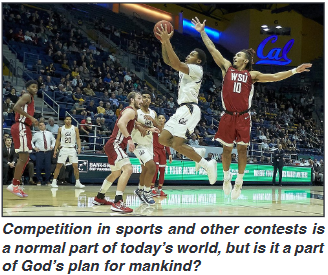 Nearly everything in this world has been placed into a competitive mold to one degree or another. In fact, when a new sport or pastime is invented, it is not long before some competitive format is invented to see who can be the best participant in it, who can defeat the other in some sort of contest. Besides the well-known competitions of race cars, sports — epitomized by the Olympics — cooking, academic contests, and so on, the Guinness Book of Records lists thousands of other competitions such as the longest egg tossing distance, the longest time spent playing Grand Theft Auto IV, or the largest number of hot dogs consumed in three minutes (Guinness world records, www.wikipedia.org). If there is any sort of event, it seems that competition within that event comes next! It is a spirit that pervades every facet of our present world.
Nearly everything in this world has been placed into a competitive mold to one degree or another. In fact, when a new sport or pastime is invented, it is not long before some competitive format is invented to see who can be the best participant in it, who can defeat the other in some sort of contest. Besides the well-known competitions of race cars, sports — epitomized by the Olympics — cooking, academic contests, and so on, the Guinness Book of Records lists thousands of other competitions such as the longest egg tossing distance, the longest time spent playing Grand Theft Auto IV, or the largest number of hot dogs consumed in three minutes (Guinness world records, www.wikipedia.org). If there is any sort of event, it seems that competition within that event comes next! It is a spirit that pervades every facet of our present world.
Competition Defined
The meaning of competition is defined by Webster’s New World College Dictionary, (Fourth Edition, Agnes and Guralnik, Wiley Publishing, Inc., 2004), as follows:
Competition. From the Latin competitio.
- The act of competing; rivalry
- A contest or match
- Official participation in organized sport
- Opposition in a contest or match
- Rivalry in business, as for customers or markets
- The person or persons against whom one competes
The word compete is defined as “to strive together for, to rush at, to enter into or be in rivalry, contend, vie (in a contest, athletic meet, etc.).” A close synonym, according to Webster, is rivalry, which implies “keen competition between opponents more or less evenly matched; it often suggests unfriendliness or even hostility.”
These definitions of competition show that the term describes people or groups that are striving to excel above others in some sort of enterprise, be it sports, politics, education, business, or some other endeavor. It is a term that describes unfriendliness or even hostility, in many cases as one person or group strives to put itself above — to be shown as better than — other people in the contest. It is the very nature of Satan himself, who arranges society in a hierarchy of worth based on human ranking — not a Godly view of a person’s worth, for almighty God, who made man in His own image (Genesis 1:27), states:
“Let nothing be done through selfish ambition or conceit, but in lowliness of mind let each esteem others better than himself” (Philippians 2:3).
“Be of the same mind toward one another. Do not set your mind on high things, but associate with the humble [tapeinos, ‘depressed humiliated’]. Do not be wise in your own opinion” (Romans 12:16).
“Humble yourselves in the sight of the Lord, and He will lift you up” (James 4:10).
“Likewise you younger people, submit yourselves to your elders. Yes, all of you be submissive to one another, and be clothed with humility, for ‘God resists the proud, but gives grace to the humble’” (I Peter 5:5, as quoted from Proverbs 3:34).
“…submitting to one another in the fear of God” (Ephesians 5:21).
“Be kindly affectionate to one another with brotherly love, in honor giving preference to one another” (Romans 12:10).
“… but to this one will I look: On him who is poor and of a contrite spirit, and who trembles at My word” (Isaiah 66:2).
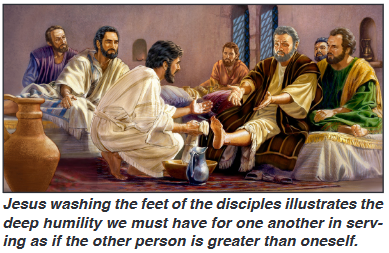 Especially note John 13:2-15, where Jesus Himself washed the feet of the disciples, placing Himself, the very Creator of things on this earth, below the disciples, as it were, to profoundly illustrate how each of us is to treat one another: to look upon others as being better than oneself, with the least being the greatest (Luke 9:48), and the last first (Luke 13:30; Matthew 20:16). Humility before God and man is the very essence of righteous character.
Especially note John 13:2-15, where Jesus Himself washed the feet of the disciples, placing Himself, the very Creator of things on this earth, below the disciples, as it were, to profoundly illustrate how each of us is to treat one another: to look upon others as being better than oneself, with the least being the greatest (Luke 9:48), and the last first (Luke 13:30; Matthew 20:16). Humility before God and man is the very essence of righteous character.
These character qualities — fruits of the spirit — of Jesus are emphasized in Galatians 5:22-23: love, joy, peace, patience, kindness, goodness, faithfulness, gentleness, and self-control. They are opposed to the fruits of the flesh as given in Galatians 5:19-21: adultery, fornication, uncleanness, lewdness, idolatry, sorcery, hatred, contentions, jealousies, outbursts of wrath, selfish ambitions, dissensions, heresies, envy, murders, drunkenness, and revelries. Contentions and selfish ambitions, along with pride and other forms of self-aggrandizement and strife, are akin to competition.
Thus, we can conclude with confidence that competition between people is an outgrowth of Satan’s wavelength, the putting of oneself above others in terms of their value, the exact opposite of Paul’s statement in Philippians 2:3 that we must “in lowliness of mind … esteem others better than [oneself].” Competition is the lifting up of the self to show some sort of superiority above others who are in the race, expressing pride and vanity when the Eternal admonishes us to live humbly.
“The wicked in his proud countenance does not seek God; God is in none of his thoughts” (Psalm 10:4).
proud = gobahh, “elation, grandeur, arrogance.”
“The fear of the Lord is to hate evil; pride and arrogance and the evil way and the perverse mouth I hate” (Proverbs 8:13).
pride = geah, “arrogance.”
arrogance = tahpukah, “perversity or fraud.”
“A man’s pride will bring him low, but the humble in spirit will retain honor” (Proverbs 29:23).
pride = gaarah, “arrogance or majesty.”
humble = shaphal, “depressed.”
This pride instilled in man’s hearts by the Adversary gives rise to the hierarchy of mankind’s culture. This arrogancy is summarized below, showing the contrast between God’s and Satan’s systems.
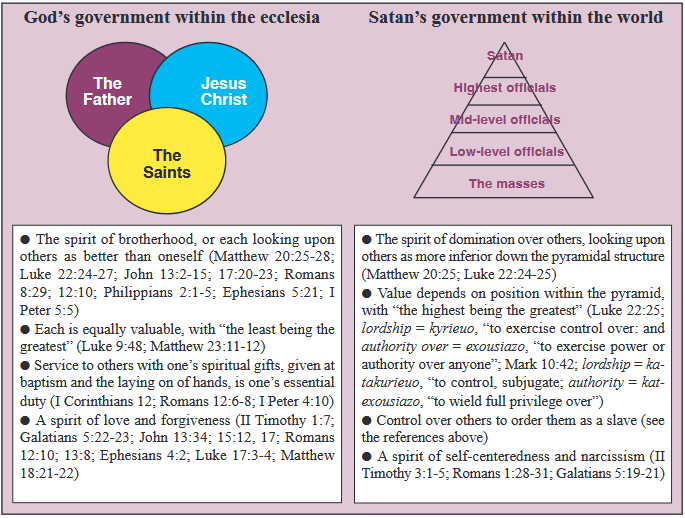
We can see this pyramidal system of governance — of man ruling over man — extant throughout our society. It is the opposite system of God’s love, wherein the Father is in Christ, and the Father and Christ are both within the brethren (John 17:21). It stands in stark contrast to Christ’s words in John 15;10-15:
“If you keep My commandments, you will abide in My love, just as I have kept My Father’s commandments and abide in His love. These things I have spoken to you, that My joy may remain in you, and that your joy may be full. This is My commandment, that you love one another as I have loved you. Greater love has no one than this, than to lay down one’s life for his friends. You are My friends if you do whatever I command you. No longer do I call you servants, for a servant does not know what his master is doing; but I have called you friends, for all things that I heard from My Father I have made known to you.”
It also stands in sharp contrast to Paul”s words in I Corinthians 13:1-7:
“Though I speak with the tongues of men and of angels, but have not love, I have become sounding brass or a clanging cymbal. And though I have the gift of mysteries and all knowledge, and though I have all faith, so that I could remove mountains, but have not love, I am nothing. And though I bestow all my goods to feed the poor, and though I give my body to be burned, but have not love, it profits me nothing. Love suffers long and is kind; love does not envy; love does not parade itself, is not puffed up; does not behave rudely, does not seek its own, is not provoked, thinks no evil; does not rejoice in iniquity, but rejoices in the truth; bears all things, believes all things, hopes all things, endures all things.”
We are to serve one another with our spiritual gifts (Romans 12:6-8; I Peter 4:10), not compete with one another when using those spiritual gifts, or try to suppress the gifts of others because we might not have what someone else has. We must encourage brethren to utilize their gifts and profit from them as they profit from our own gifts.
The World’s Competition
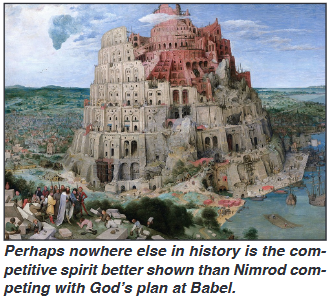 The spirit of competition began in the Garden of Eden when Cain slew Abel. Cain grew jealous of Yahweh’s acceptance of Abel’s offering of the firstborn of his flock, while his own offering of the produce of the soil was not respected. In Cain’s hatred for his brother — his competition with him before God’s presence — he slew Abel. This spirit of seeking to elevate oneself above others, rather than love and embrace them — forgive one’s brother even seventy times seven times (Matthew 18:22) — has been carried on throughout mankind’s history as evidenced by a multitude of events revealed in Scripture:
The spirit of competition began in the Garden of Eden when Cain slew Abel. Cain grew jealous of Yahweh’s acceptance of Abel’s offering of the firstborn of his flock, while his own offering of the produce of the soil was not respected. In Cain’s hatred for his brother — his competition with him before God’s presence — he slew Abel. This spirit of seeking to elevate oneself above others, rather than love and embrace them — forgive one’s brother even seventy times seven times (Matthew 18:22) — has been carried on throughout mankind’s history as evidenced by a multitude of events revealed in Scripture:
- Nimrod competing with God at the Tower of Babel, attempting to keep all nations subject to him using one language, and covering the earth with cities (Genesis 10:9-12; 11:1-4)
- Lucifer attempting to be equal with, or superior to, his Father (“I will ascend above the heights of the clouds, I will be like the Most High” Isaiah 14:14)
- Various Kings of Israel and Judah murdering their competitors to the throne, and killing potential heirs (for example, Saul competing against David, even though Saul knew David would be king after him; I Samuel 24:16-20; 26:2)
- Various wars among competing nations: in ancient times, Israel vs. Judah, Assyria vs. Babylon, Rome vs. Carthage, etc.; in more modern times, Germany and Japan vs. the Allies, Iran vs. Israel, etc.
- Esau competing against Jacob to try and reclaim his birthright (Genesis 27:41)
- Many, many more events
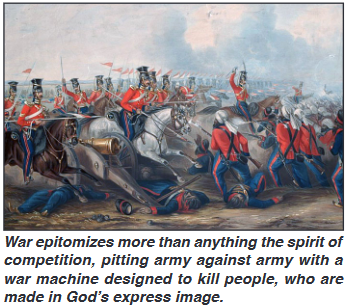 War is perhaps the mostly widely used competitive crucible that the Devil uses to disrupt humanity. He hates humankind, which is designed by the Creator to be kings and priests in His very own image, brothers of Jesus Christ (Romans 8:29; Revelation 5:10; 20:4), who will replace Satan as leaders in the earth once this age has passed. Though the present god of this world (II Corinthians 4:4; Ephesians 2:2; Matthew 4:8-9), he will do most anything he can to foment misery and death amongst God’s creations, an example being his subjecting Job to the loss of his family and possessions (Job 1 and 2).
War is perhaps the mostly widely used competitive crucible that the Devil uses to disrupt humanity. He hates humankind, which is designed by the Creator to be kings and priests in His very own image, brothers of Jesus Christ (Romans 8:29; Revelation 5:10; 20:4), who will replace Satan as leaders in the earth once this age has passed. Though the present god of this world (II Corinthians 4:4; Ephesians 2:2; Matthew 4:8-9), he will do most anything he can to foment misery and death amongst God’s creations, an example being his subjecting Job to the loss of his family and possessions (Job 1 and 2).
Through the crucible of wars over the centuries, brought about by divisions of mankind according to religious persuasion, political affiliation, social caste, or racial grouping, Satan has brought about the killing of perhaps 300 to 500 million people since 500 B.C. (List of wars by death toll, www.wikipedia.org). This total does not include the multiple millions who were killed before 500 B.C., going back to the Flood, and before that during pre-Flood centuries. Nor does this total include all of the lives lost due to diseases and famine associated with wars … or the pain and suffering of entire populations due to ongoing wars. Competition among peoples and nations is the major catalyst for these confrontations. Their author is Satan the Devil.
Competition’s Effects
Psychologists have examined competition and concluded that people’s tendency toward competitiveness is ruled by genetics, environment, and situations. As M. Foley stated in “The psychology of competitiveness” (August 1, 2024, www.psychologytoday.com):
“Competitiveness is a powerful force that can drive people to achieve remarkable feats, but can also lead to conflict and stress. … Today, we have moved beyond competing for basic survival needs into competing in sports, academics, careers, and social status.”
A study published in Frontiers of Psychology by B. MiMenichi and E. Tricomi revealed that a competitive environment is harmful to memory, and an interesting study from Turkey by A. Yayla and O. Cevik (International Journal of Psychology and Educational Studies 9, pages 967-977, 2020) concluded that:
“Competition [in the school learning environment] prevents students from realizing their full potential, skills, and talents. In addition, it disrupts friendships and causes students to experience emotional difficulties, which negatively impacts moral development. Although competition in schools is viewed as a useful motivator, it causes students to experience stress.”
In the business environment, competition causes difficulty in brand differentiation, contributes to pricing pressure, increases marketing expenses, and makes gaining marketing share a problem. Fierce competition can make it hard for businesses to establish their brand identity and stand out from competitors, forcing them to lower prices and spend more on marketing and advertising. This can impact their profits and limit potential growth, making it difficult to reach new customers. Competition can cause problems for businesses such as uncooperative behavior, market saturation, price wars, and reduced profit margins. It may also negatively impact public goods and society (www.ecomstrive.com, July 11, 2023).
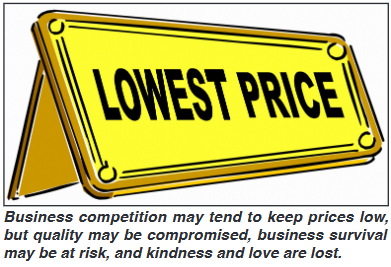 What the author does not admit is that these “advantages” are usually motivated by the desire for profit, and overpowering a competing enterprise. Producing goods and services because of the love of one’s neighbor is not in the mix. Corporate and individual goals of profit maximization — without a conscience guided by love to God and love to neighbor (Matthew 22:36-40) — is the guiding principle of today’s business enterprises. Countless examples could be given to varify this truth amidst government agencies, the pharmaceutical industry, agribusiness and grain marketing, the food industry, and the auto and petroleum industries for starters. The love of money takes on a life of its own (I Timothy 6:10). It knows no limits, as evidenced by the many millionaires and billionaires in this world who amass fortunes far in excess of their needs for living. Even then they are never satisfied with their current worth and strive for even more. Few of these people will attain the Kingdom of God (Matthew 19:23-24; Mark 10:23-25; Luke 18:24-25).
What the author does not admit is that these “advantages” are usually motivated by the desire for profit, and overpowering a competing enterprise. Producing goods and services because of the love of one’s neighbor is not in the mix. Corporate and individual goals of profit maximization — without a conscience guided by love to God and love to neighbor (Matthew 22:36-40) — is the guiding principle of today’s business enterprises. Countless examples could be given to varify this truth amidst government agencies, the pharmaceutical industry, agribusiness and grain marketing, the food industry, and the auto and petroleum industries for starters. The love of money takes on a life of its own (I Timothy 6:10). It knows no limits, as evidenced by the many millionaires and billionaires in this world who amass fortunes far in excess of their needs for living. Even then they are never satisfied with their current worth and strive for even more. Few of these people will attain the Kingdom of God (Matthew 19:23-24; Mark 10:23-25; Luke 18:24-25).
More Advice from Our Creator
We have seen from God’s word that competition within the societies of man is not of God, but is the attempt to place oneself above others, to somehow show that you are better than the other person who was made in God’s image … a person who has just as great a potential to become a son of God as you do, whom the Creator loves just as He loves you and pleads for you and every person to come to Him in a spirit of humility, joy, peace, and kindness.
Yet, the fact remains that Paul spoke of running a race and winning. What is this message telling us?
“Do you not know that those who run in a race all run, but one receives the prize? Run in such a way that you may obtain it. And everyone who competes for the prize is temperate in all things. Now they do it to obtain a perishable crown, but we for an imperishable crown. Therefore I run thus: not with uncertainity. Thus I fight: not as one who beats the air. But I discipline my body and bring it into subjection, lest, when I have preached to others, I myself should become disqualified” (I Corinthians 9:24-27).
Is Paul claiming that the spirit of competition is correct and good, that we ought to have the attitude of winning above our brethren … to “beat out” our neighbor to thus gain some sort of control over him or show our superiority? What is he really saying here?
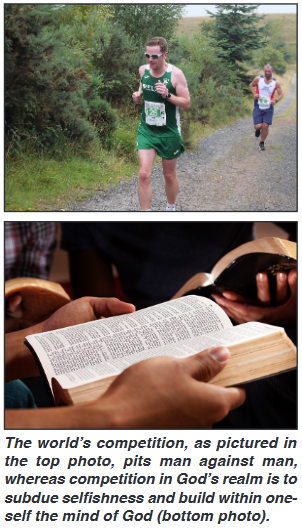 Is Paul not analogizing from a competitive sports point of view — where the objective of participants is to win above other participants — that in this present life we who are called to salvation in Christ must, like an athlete, train diligently so we might gain the victory over Satan in this world, and over our own inborn, self-centered human nature (Psalm 51;5)? Instead of training by running, lifting weights, sparring with fellow athletes, or jumping hurdles we instead bring our body, mind, and spirit into subjection to the holy spirit within us by praying, meditating, studying God’s word, fasting, fellowshipping with brethren, and exercising our spiritual gifts for the uplift of our brethren. As Paul, Peter, and John wrote, we train for the attainment of a spiritual crown — the resurrection and eternal life — not a physical trophy or certificate that perishes (II Timothy 4:8; James 1:12; I Peter 5:4; Revelation 2:10). To attain that crown of eternal life does indeed require considerable discipline. It is a daily exercise that sometimes pushes us to the limit of our endurance, taxing our physical and spiritual abilities to the extreme! As Peter said,
Is Paul not analogizing from a competitive sports point of view — where the objective of participants is to win above other participants — that in this present life we who are called to salvation in Christ must, like an athlete, train diligently so we might gain the victory over Satan in this world, and over our own inborn, self-centered human nature (Psalm 51;5)? Instead of training by running, lifting weights, sparring with fellow athletes, or jumping hurdles we instead bring our body, mind, and spirit into subjection to the holy spirit within us by praying, meditating, studying God’s word, fasting, fellowshipping with brethren, and exercising our spiritual gifts for the uplift of our brethren. As Paul, Peter, and John wrote, we train for the attainment of a spiritual crown — the resurrection and eternal life — not a physical trophy or certificate that perishes (II Timothy 4:8; James 1:12; I Peter 5:4; Revelation 2:10). To attain that crown of eternal life does indeed require considerable discipline. It is a daily exercise that sometimes pushes us to the limit of our endurance, taxing our physical and spiritual abilities to the extreme! As Peter said,
“In this you greatly rejoice, though now for a little while, if need be, you have been grieved by various trials, that the genuineness of your faith, being much more precious than gold that perishes, though it is tested by fire, may be found to praise, honor, and glory at the revelation of Jesus Christ” (I Peter 1:6-7).
The meaning of Paul’s analogy, then, to sporting competition and fighting is that WE MUST COMPETE WITHIN OURSELVES TO GAIN THE VICTORY OVER SELFISH PRIDE AND HUMAN NATURE THAT WISHES TO EXALT ITSELF. We discipline our mind and body to serve the living god with all of our mind and soul for that imperishable crown set before us. As Jesus said to the lawyer in Matthew 22:36-40, we must love the Lord our Elohim with all of our heart, soul, and mind, and love our neighbor as ourself. The competition is an internal one, against our own human nature, and Satan the tempter. It is that nature which each of us must overcome … not overcome our fellow man, but we must support and encourage our fellow brethren, and those in the world around us as opportunity permits (Galatians 6:10).
“I write to you, little children, because your sins are forgiven you for His name’s sake. I write to you, fathers, because you have known Him who is from the beginning. I write to you, young men, because you have overcome the wicked one. I write to you, little children, because you have known the Father. I have written to you fathers, because you have known Him who is from the beginning. I have written to you, young men, because you are strong, and the word of God abides in you and you have overcome the wicked one.” (I John 2:12-14).
overcome = nikao, “to subdue, literally or figuratively:; from nike, “conquest, i.e. the means of success.”
Notice in the messages to the seven congregations in Revelation:
“To him who overcomes I will give to eat from the tree of life, which is in the midst of the Paradise of God” (Revelation 2:7).
“He who overcomes shall not be hurt by the second death” (Revelation 2:11).
“To him who overcomes I will give some of the hidden manna to eat. And I will give him a white stone, and on the stone a new name written which no one knows except him who receives it” (Revelation 2:17).
“And he who overcomes, and keeps My works until the end, to him I will give power over the nations — ‘He shall rule them with a rod of iron; they shall be dashed to pieces like the potter’s vessels’ — as I also have received from My Father; and I will give him the morning star” (Revelation 2:26-28).
“He who overcomes shall be clothed in white garments, and I will not blot out his name from the Book of Life; but I will confess his name before My Father and before His angels” (Revelation 3:5).
“He who overcomes, I will make him a pillar in the temple of My God, and he shall go out no more. I will write on him the name of My God, the New Jerusalem, which comes down out of heaven from My God. And I will write on him My new name” (Revelation 3:12).
“To him who overcomes I will grant to sit with Me on My throne, as I also overcame and sat down with My Father on His throne” (Revelation 3:21).
In every case the word overcomes is the Greek word nikao, meaning “to subdue, literally or figuratively.” It is a word akin to the words spoken by Jesus Christ regarding our need to stand fast in the faith during our days here on the earth: “But he who endures to the end shall be saved” (Matthew 24:13; restated in Matthew 10:22). It is a heralding cry to COMPETE WITH SATAN AND OURSELVES TO NOT NEGLECT SUCH A GREAT SALVATION OFFERED TO US, LEST WE DRIFT AWAY (Hebrews 2:1-3). Drift away is the Greek pararrhueo, meaning “to flow by, i.e. (figuratively) carelessly pass.” We must resist Satan so that he will flee from us (I Peter 5:8-9; James 4:7).
The Final Word
We have learned that competition in this world’s system is of the Devil and is to be avoided. That is a type of competition wherein one person or group of people attempt to place themselves, in their own minds, as better than others. This is the essence of human pride, and the opposite of God’s intended relationship among mankind to be based upon love … of Himself first and also of our fellowman. The Adversary has imparted this competitive spirit within this society to keep people on a war footing; war involves men and machines of war killing other people. He wants to destroy mankind, for people are made in the image of God, and once they attaint the resurrection they will replace Satan on the throne of the earth, alongside Jesus Christ and the Father (Revelation 3:21).
Competition with others is self-centeredness. However, proper competition is to compete within oneself to put away sin and selfishness and reach out to others in love, kindness, joy, and peace. We are to “do whatever we do with our might” (Ecclesiastes 9:10), but only in the process of utilizing our God-given talents to serve others. It is not to somehow overcome them or place yourself above them in value. Love craves the joy and uplift of one’s fellow man. It strives to help him fulfill his gifts and needs.
In this “race of life” we are indeed to give it everything we have, but not at the expense of our fellow man. Him we must respect and love. A most exciting example of this view on competition is the case of a pair of runners in a 10-km race in Maine. They were running as serious competitors, but when one of them stumbled and fell near the finish line, the other runner stopped to help him cross the finish line and gain first place … proving that even within programmed confrontational competition it is possible for people to challenge the laws of selfishness behavior, reject personal glory, and love one’s neighbor. Here is their story (B. Liquor, Runner purposefully sacrifices first-place win to help carry rival to finish line, Goalcast, August 24, www.goalcast.com).
“Seasoned marathoner Rob Lopez entered the famed 10-kilometer TD Bank Beach to Beacon race in Maine in peak form and with his eye on the prize. However, from the starter’s gate he knew that there was one person he’d have to beat: young up-and-comer Jesse Orach. The stakes couldn’t have been higher. Whoever finished ahead of the other would win the prized men’s Maine-resident division of the race and a cool $1,000.
 “With a cushy lead and approaching the finish, it looked like Orach would cruise to victory. Lopez thought so too. ‘The first mile, I stuck with him,’ Lopez said. ‘Then he pulled away. As a runner, I’ve done enough of these to know that it wasn’t going to be my day.’
“With a cushy lead and approaching the finish, it looked like Orach would cruise to victory. Lopez thought so too. ‘The first mile, I stuck with him,’ Lopez said. ‘Then he pulled away. As a runner, I’ve done enough of these to know that it wasn’t going to be my day.’
“Until it was.
“That’s because just strides from the finish line, disaster struck Orach. ‘But I was so focused on getting to the finish line I stumbled forward for maybe another 10 feet and fell down again,’ Orach recalled.
“Then the unforgettable happened. ‘It kind of seemed like it was over for me,’ said Orach. ‘Then, I felt someone pick me up.’ Incredibly, that someone was none other than Lopez. Turning the final corner, he spotted a collapsed Orach, picked him up, and propelled him across the finish line to first place. With that, he passed up both the win and the prize money.
“Explaining to the Press Herald, Lopez said that in that moment camaraderie overtook competition. ‘It wasn’t a calculated decision,’ he said. ‘It wasn’t because I’m some sort of hero or some sort of special person, because I’m not. As runners, we understand we pick each other up and help each other.’
“Orach, like everyone else, was awestruck. ‘I’m speechless with what he did. Him and I were kind of vying for that number one Mainer spot, and for him to give that up for me is pretty remarkable.’ It almost seemed like Lopez was reading the script to the wrong movie. Most would have thought that this film would end with Lopez victorious, celebrating slow motion with the glory and money. Instead, Lopez did what real heroes do: elevate others and share the spotlight. That’s a role we can all strive for.”

